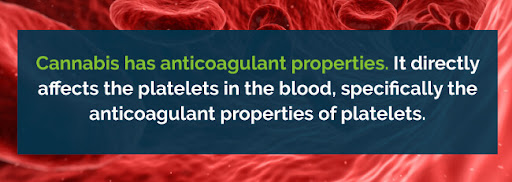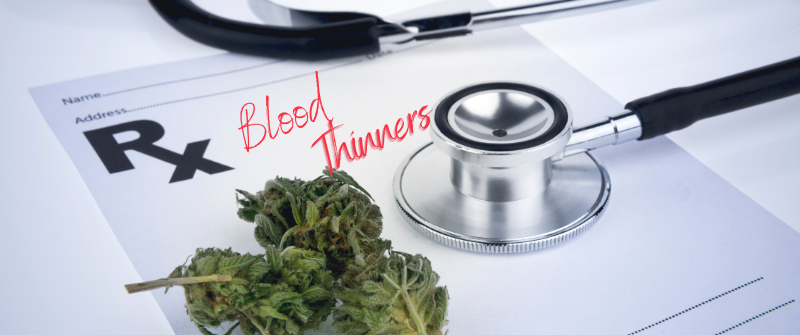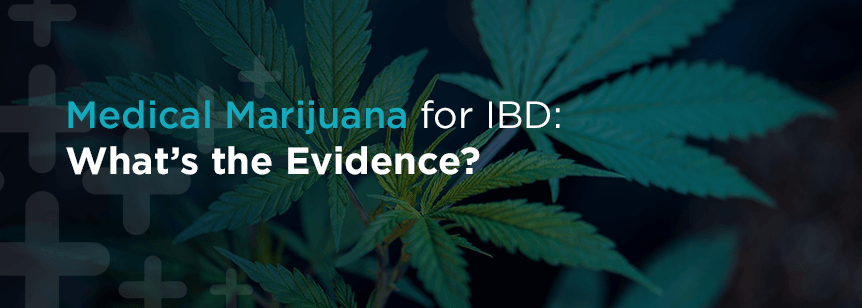The use of cannabis for medicinal purposes is now legal in many states throughout the U.S. This is excellent news for patients struggling with several debilitating disorders that medical marijuana can effectively treat. However, this raises more questions about the effects it might have on certain conditions, especially those requiring patients to take other medications.

Among these medications are blood thinners. Since the anticoagulant effect of blood thinners can be increased with cannabis, many medical professionals refuse to recommend it for patients on this type of medication. They don’t realize that cannabis has some natural blood thinning properties and could be a suitable replacement for anticoagulant meds.
The lack of knowledge surrounding the use of medical marijuana leads some doctors to advise patients using blood thinners for their clotting deficiency or other cardiac medical conditions not to use cannabis oils. The medical world does not yet fully understand the benefits of medical marijuana.
Understanding the Science of Blood Clots and Cannabis
Blood clots prevent blood from flowing as it should. They occur when specific blood cells, called platelets, build up inside an artery or vein.
Blood clots are an essential bodily function that stops you from bleeding out when you have a wound or injury, but they can be quite dangerous when they form inappropriately. To prevent this, doctors prescribe blood thinners. Blood thinners don’t change the consistency of blood. They inhibit blood clotting activity.
- Antiplatelet: These prevent platelets from clumping together and forming a clot.
- Anticoagulant: Creates a chemical reaction that extends how long it takes to develop a clot.

Is Marijuana a Blood Thinner? (Anti-Coagulant)?
Some people take cannabis because they believe it has an anticoagulant effect on the platelets in the blood. There aren’t many studies on this component of medical marijuana, so researchers aren’t entirely sure what causes this.
Marijuana is full of phytocannabinoids that help various physiological functions, including blood thinning. However, research remains quite limited on the mechanisms responsible for the blood-thinning properties of cannabis. Currently, the only study thus far highlighting the anticoagulative effects of marijuana on blood was done on obese rodents.
Researchers in this study concluded that certain cannabinoids, CBD, THC, and CBN, impair blood clotting activity and that the presence of anandamide, an endocannabinoid, shows clotting potential in vitro.
The study also revealed cannabis cannabinoids modulate thrombin activity in the blood. Thrombin is an enzyme that converts fibrinogen to fibrin to trigger blood clot formation. It also suggests that certain receptors (peroxisome proliferator-activated receptors or PPARy) in the blood vessels have a high affinity for cannabinoids, particularly THC and CBD.
Until marijuana is declassified as an illegal substance or rescheduled into a lower tier, researchers cannot perform clinical studies on humans to see if they can replicate the same or similar effects in humans and confidently determine if cannabis has any impact on blood platelet and clotting activity.
Do Blood Thinners Affect Weed?
Although there’s not much direct research on the effects of cannabis on the blood, there is evidence that combining marijuana with blood thinner medications can lead to adverse effects. The liver is an organ that filters, detoxifies, and breaks down or metabolizes drugs and substances in the blood.
The very same liver enzymes that metabolize blood-thinning medications also metabolize cannabis. Combining statins and blood thinner medications with marijuana alters their effects and potencies. Marijuana decreases the effectiveness of these medications and, in some cases, may lead to harmful drug interactions.
Does Smoking Weed Thin Blood?
For the most part, many users regularly use cannabis while on blood thinners. However, the dangers of cannabis to these individuals are often directly linked to consumption methods. Users who smoke incur the harmful side effects of smoking and any notable downsides they may experience. Edibles and topicals are among the preferred consumption methods for cannabis users on blood thinner treatments.
How Does Marijuana Interact with Blood Thinners?
The reason marijuana increases the anticoagulant effect of blood thinners seems to be related to the fact that the substance inhibits the drug’s metabolism and displaces it from its protein-binding sites.
Cannabis possesses properties that negatively interfere with blood thinner medications and treatments. These effects happen in two ways: the first allegedly decreases the positive effects of therapy while exacerbating the adverse side effects associated with many pharmaceutical drugs. There is also the possibility of toxicity, dependence, and overdose.
Many blood thinner patients have cardiovascular issues like high blood pressure, making cannabis use risky and potentially dangerous. Among the notorious side effects of weed is abnormal cardiac activity, which can lead to strokes. The adverse impact on those with heart conditions is predominantly seen in those who smoke or vape THC-rich strains. There are also potential concerns for those who use other forms of marijuana.
Despite warnings of the possible adverse interactions of mixing marijuana with prescription drugs like Warfarin, many people continue to combine the two. Although weed reportedly has some anticoagulant activity, there’s no direct link between long-term use and blood thinning.
Anyone with cardiovascular issues considering using cannabis while on blood thinner medications or treatments should discuss their decision with their physician to learn alternative treatment recommendations, and how their use of marijuana may affect their treatment plan and cardiac and overall health. It is crucial for patients to undergo medical supervision when adding cannabis to their medical treatment plans.
CBD and Blood Thinners
CBD-rich strains of marijuana reportedly have the opposite effect on cardiovascular activity and blood platelets. The vessels in the body are full of PPARy receptors that have a high affinity for CBD. When combined with blood thinning medications, CBD> decreases the body’s metabolic activity on pharmaceutical meds taking longer to break them down while intensifying their effects on platelet activity.
Cannabis increases the availability of Warfarin and many other big-pharma drugs in the body, which increases the risk of hemorrhaging and complications. Some studies show that lowering the dosage of pharmaceutical medications, especially anticoagulants, when using weed can counteract the potential adverse interactions.
Best Way to Use Marijuana While on Blood Thinners
Regardless of consumption method, people on blood thinners and cardiac medications are vulnerable to adverse drug interactions with cannabis. The best way to reduce this potential is to remain smoke-free.
Marijuana is available in various products and forms, allowing users to medicate safely and responsibly. Edibles, topicals, and tinctures are more potent than smokable cannabis flower and are among the most popular cannabis consumption methods for those worried about the dangers of smoke inhalation. Products consumed are processed by the liver, which intensifies the effects of marijuana on the user.
Can You Smoke Weed on Blood Thinners?
Despite the dangers of smoke inhalation on the body and overall health, many patients on blood thinners continue to smoke nicotine and cannabis. Smoking causes the blood vessels to become narrower, thus reducing blood flow to the organs and throughout the body.
Long-term use also causes the vessels to become stiffer and less elastic, increasing the risk of additional vascular, respiratory ailments, and overall health concerns. Smoking weed while on blood thinners is exceptionally hazardous to those with abnormal blood clotting activity and cardiac or vascular health conditions.
Cannabis as a Blood Thinner Alternative
More studies on cannabis are needed for the medical world to support the use of medical marijuana rather than traditional blood thinning meds. However, if a patient is on blood thinners and would like to switch to medical marijuana treatments, it should be done under the watchful eye of a physician.
It’s advisable that oil blends should be high THC and high CBD (2 ounces of THC to 1 ounce of CBD. Patients should avoid the use of oil and omega-3 fatty acid supplements without coordinating with their physician. These fats may increase the effects of blood thinners.
Cannabis treatments are very good for many illnesses and conditions and have properties that react on almost any part of the body. Unfortunately, because of the years of withholding medicinal treatments derived from the plant from the general population, skepticism has built up — not just from medical doctors but also from patients. For this reason, many still prefer using lab-fabricated medicines, which have many adverse side effects and are far more harmful to the body.
What Medications Don’t Mix With Weed?
The main active compounds in cannabis, THC, and CBD, modulate drug metabolism and activity. These deviations make it difficult for users to avoid adverse drug interactions and increase the risk of abuse and addiction disorders.
Common symptoms associated with adverse drug and weed interactions include dizziness, confusion, lethargy, rapid or shallow breathing, increased or decreased heart rate, dips and spikes in blood pressure, impaired motor, thinking, and judgment functions, aspiration, and psychosis.
Patients on the following types of prescription medications are at risk of harmful cannabinoid and pharmaceutical drug interactions.
- Antidepressants and antipsychotics like Zoloft (sertraline), Seroquel, clozapine, valproate, etc., reportedly increase the risk of liver impairment and injury, mood instability and disorders, and addiction.
- Cardiovascular medications, such as Warfarin, statins, etc., increase the risk of abnormal and excessive bleeding.
- Bronchodilators like theophylline, beta-2 agonists (salbutamol, formoterol, and vilanterol), and anticholinergics, such as ipratropium, tiotropium, and glycopyrronium are beneficial for those with respiratory issues become less effective when mixed with marijuana.
- Antiseizure drugs like benzodiazepines tend to cause mild side effects when mixed with marijuana. Although CBD has antiseizure properties, combining the cannabinoid with blood thinners and other medications amplifies the sedative side effects associated with both substances.
It is possible to use cannabis when on prescription drugs, but to do it safely, you need to be aware of the potential dangers and dose responsibly. If you’re planning to use marijuana while on prescription medications, notify your doctor of your intent and all medicines and health or beauty supplements you are on. Your physician will review your medical history and treatment needs and discuss potential risks and concerns relevant to your situation.
Do not stop taking your medications as prescribed without medical clearance. Alternative medications may be recommended so you can reap the positive effects of marijuana without compromising your overall health needs.
Talk to a Medical Marijuana Doctor to Explore Treatment Options
The full potential of medical marijuana can’t be understood until more scientific studies are allowed to be performed. Because of this lack of knowledge, patients don’t contact their physicians about cannabis treatment options.
If you live in a state where medical marijuana is legal, make an appointment to speak to a medical professional near you or contact a medical marijuana dispensary to talk to a budtender. They can address your concerns and point you in the right direction.
Our advice shouldn’t replace that of a qualified professional. Suppose you’re on blood thinners and would like to use cannabis. In that case, we still advise doing so under the supervision of a medical doctor who knows the benefits of medical marijuana to avoid complications.





